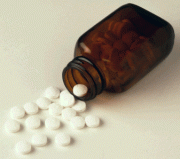Article
Chronic Corticosteroids Can Impair Post-Op Wound Healing
Author(s):
While the use of acute, high-dose systemic corticosteroids probably has no clinically significant effect on wound healing, chronic systemic corticosteroids may impair postoperative healing in susceptible patients.

The fact that systemic corticosteroids impair wound healing becomes a concern when patients with asthma, rheumatoid arthritis, gout, or any other chronic or acute condition that requires the drugs are in need of surgery. Like all potential causes and contributors to impaired or delayed healing, surgeons need to understand the issue’s clinical relevance in each patient’s unique situation.
Researchers from the University of California, Davis recently published a literature review on the topic. After reviewing current thinking on normal wound healing, they summarized the molecular interactions between corticosteroids and the wound healing process. They then presented historical data on corticosteroids’ effects on wound healing in animal models and humans, as well as discussed corticosteroid dosing, chronicity, and timing relative to surgery.
Their basic findings included:
- Animals treated with 15 to 40 milligrams/kilograms of perioperative corticosteroids per day have experienced an approximately 30 percent reduction in wound tensile strength.
- Most studies in humans — and there have been few — determined that high-dose corticosteroid administration for 10 days had no clinically important effect on wound healing.
- Patients who have taken chronic corticosteroids for at least 30 days before surgery — particularly prednisone doses greater than 40 mg/day — have wound healing complication rates that are two to five times higher the rates experienced by patients who don’t take corticosteroids.
The authors concluded that the use of acute, high-dose systemic corticosteroids — such as 5 mg/day of prednisone for five to 10 days — probably has no clinically significant effect on wound healing, so those drugs shouldn’t be contraindicated in surgery. On the other hand, chronic systemic corticosteroids may impair wound healing in susceptible individuals. But, as always, surgeons must tailor corticosteroid dosing and duration to each individual patient.




